“The project will contribute to enhancing high-quality cancer care delivery to children by providing vital hard-to-find medications at a time of urgent need,” says Dr Christoph, Hamelmann, former WHO Representative.
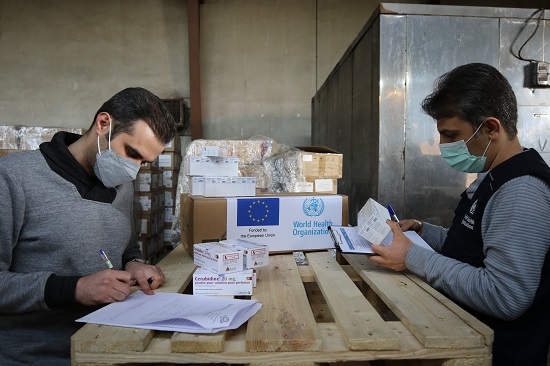 WHO is procuring 12 medicines worth nearly US$ 2 million for childhood cancer to 32 childhood treatment centres or hospitals across Islamic Republic of Iran
WHO is procuring 12 medicines worth nearly US$ 2 million for childhood cancer to 32 childhood treatment centres or hospitals across Islamic Republic of Iran
In Islamic Republic of Iran, leukaemia, brain and central nervous system tumours, lymphoma, and bone cancer are the most common cancers among children, accounting for more than half of new children cancer cases. Studies have shown that the incidence rate of childhood cancer in the country is higher compared to that in other parts of the world and its epidemiological trend is ascending. In 2020 alone, there were 2219 childhood cancer cases registered in Islamic Republic of Iran. While over 80% of children with cancer are cured in high-income countries, this rate is about 50% in Islamic Republic of Iran compared with only 20% in many low- and middle-income countries.
“Childhood cancer is important in a number of aspects; there is not much we can do in the area of preventing childhood cancer, but early diagnosis and treatment are very important since these are what the patient’s survival rates depend on,” says Dr Afshin Ostovar, Director General of the Non-Communicable Diseases Office at the Ministry of Health and Medical Education.
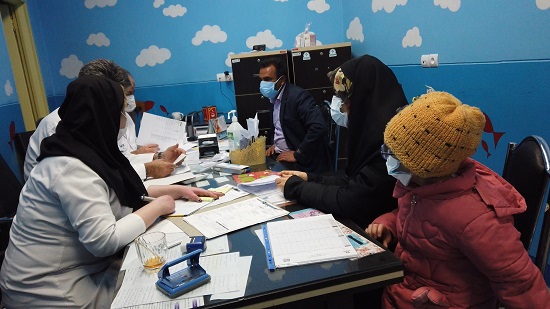 Paediatricians at a specialised children's treatment centre consult with new incoming patients
Paediatricians at a specialised children's treatment centre consult with new incoming patients
The project has procured and delivered 10 critical cancer medications worth nearly US$ 2 million to 32 specialised cancer treatment centres or hospitals covering patients in all 31 provinces of the country, including MAHAK Charity Hospital in Tehran.
In 2018, WHO launched the Global Initiative for Childhood Cancer in collaboration with other United Nations (UN) agencies to deliver best practices in childhood cancer care and increase available funding at the national and global levels. The initiative aims to provide leadership and technical assistance to support governments in building and sustaining high-quality childhood cancer programmes in line with Sustainable Development Goal 3 to ensure healthy lives and promote well-being for all at all ages. The Ministry has since adopted the initiative and works closely with WHO to achieve the goal of at least 60% survival for all children with cancer by 2030.
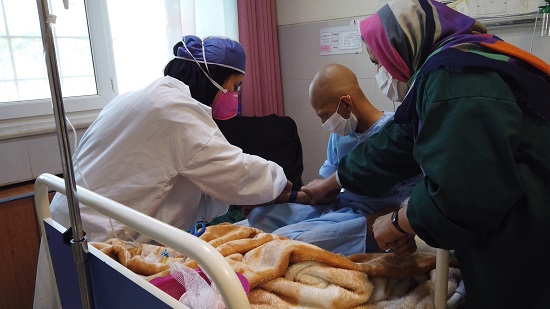 Medical staff administer chemotherapy medicine to a child with cancer at Amir Oncology Hospital in Shiraz, Fars province
Medical staff administer chemotherapy medicine to a child with cancer at Amir Oncology Hospital in Shiraz, Fars province
In Islamic Republic of Iran, the 2013–2025 National Cancer Control Programme was designed by the Ministry's National Cancer Control Secretariat. The plan comprises 4 main components, namely prevention, early detection, diagnosis and treatment, supportive and palliative care; other supporting components address policy-making, cancer research, and developing human resources for cancers in both adults and children.
While insurance companies in the country cover 70% of cancer treatment services at outpatient level and 90% at inpatient level, compensation for the remaining costs is still not easy for families. Other issues such as difficulty in obtaining accurate diagnosis, medicine, treatment, and treatment abandonment due to high cost, inaccessibility of therapy and medicine due to sanction, and distance to treatment facilities remain as the most serious challenges.
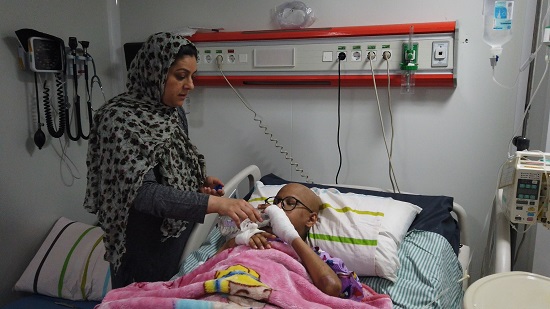 Zahra's mother helps her drink some water following bone marrow transplant surgery
Zahra's mother helps her drink some water following bone marrow transplant surgery
“There were so many issues we had to deal with, we had to travel to Tehran from our city every month, we had to find financial sources to cover the costs, and then, we could not find the medicines needed for my daughter’s chemotherapy,” says Zahra’s mother, whose daughter, 16, is just being discharged from the Bone Marrow Transplant Centre at the Children’s Medical Centre in Tehran.
Nearly 68% of families in Islamic Republic of Iran fall below the poverty line when a family member is diagnosed with cancer, according to Dr Ali Motlagh, Head of the Cancer Office at Ministry of Health and Medical Education.
“We had to sell everything, my husband quit his job, and we came to Tehran overnight to start the treatment process,” says mother of Nima, 2.5 years old, who is struggling with childhood leukaemia.
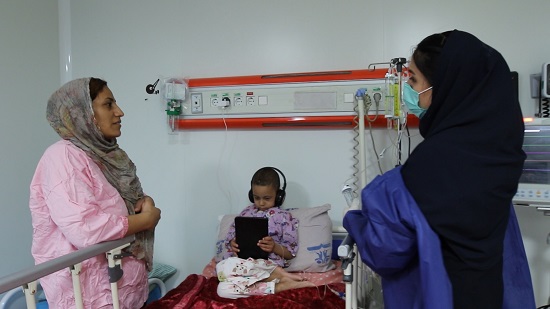 Nima's mother discusses his status with the visiting nurse
Nima's mother discusses his status with the visiting nurse
The re-imposition of unilateral sanctions in 2018 has affected the availability of, and access to, important medicines in Islamic Republic of Iran. While the majority of cancer medicines are produced in the country, most of the raw materials needed for chemotherapy are imported.
“Universal health coverage is an important concept and based on it, access is very important. After sanctions, access was not easy for all families diagnosed with cancer, the price of some medicines has increased and we could not implement all the projects in our Iran National Cancer Control Programme to improve access for cancer patients in the country,” Dr Motlagh reiterates.
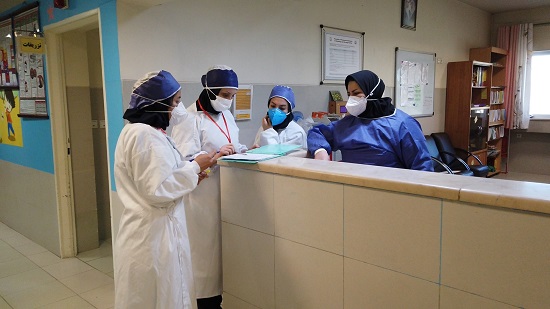 Medical staff at the oncology ward in Amir Hospital, Shiraz, discuss a patient's case and outcomes
Medical staff at the oncology ward in Amir Hospital, Shiraz, discuss a patient's case and outcomes
Despite most medical products being exempt from the sanctions in theory, uncertainty regarding the humanitarian exceptions and sanctions on international financial transfers has led to pharmaceutical shortages in the country and an increase in prices for medicines, which affects severity of morbidity and survival rates.
“I work day and night to be able to afford the expenses for my son, but even when I have the money, I cannot find the medicines,” says Arsin’s father. Arsin, who has just undergone a bone marrow transplant needs medicines to control the side effects of his surgery. But his mother says they cannot find the medicines, in spite of the medical teams doing the best they can in clinical care.
Further support from local and international organisations and donors will be particularly effective in various ways, including in raising public awareness on the importance of early detection, filling the gap in availability of comprehensive facilities, and delivering direct critical treatments in support of WHO Global Initiative for Childhood Cancer in letter and spirit.
Together, we can improve outcomes for children with cancer.








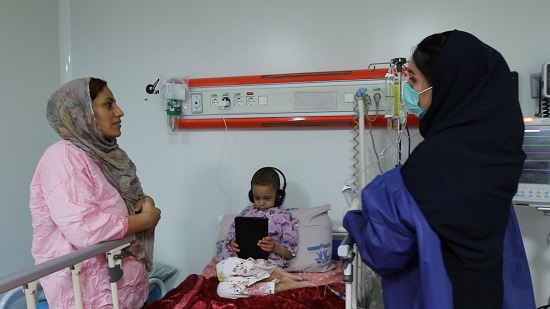 22 June 2021 – The World Health Organization is supporting the Ministry of Health and Medical Education of Islamic Republic of Iran to implement well stablished national plans to control and eliminate childhood cancer by providing over 10 essential medicines for childhood cancer.
22 June 2021 – The World Health Organization is supporting the Ministry of Health and Medical Education of Islamic Republic of Iran to implement well stablished national plans to control and eliminate childhood cancer by providing over 10 essential medicines for childhood cancer.